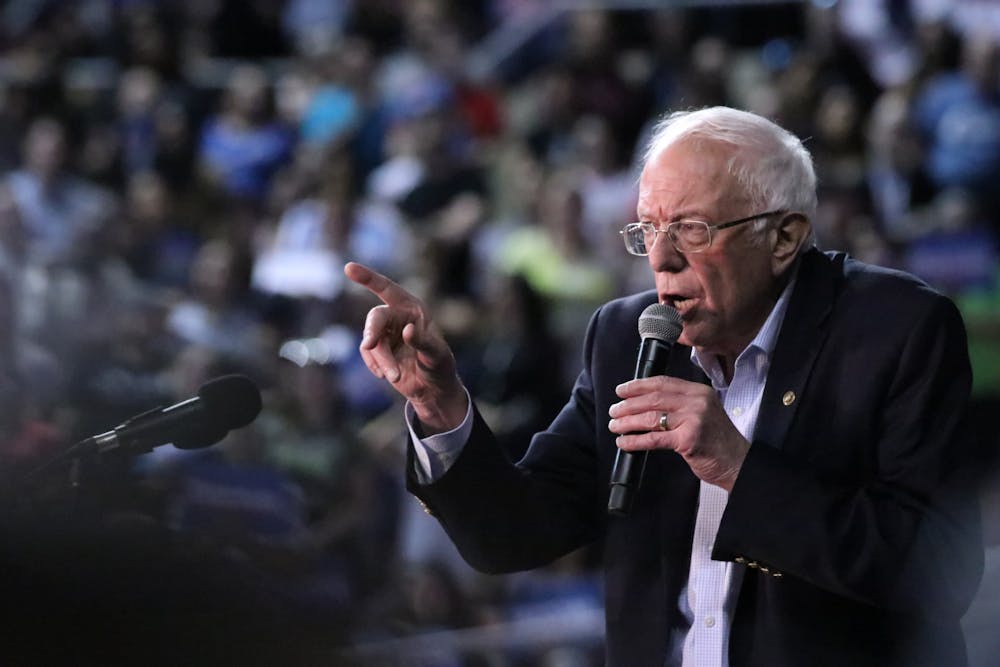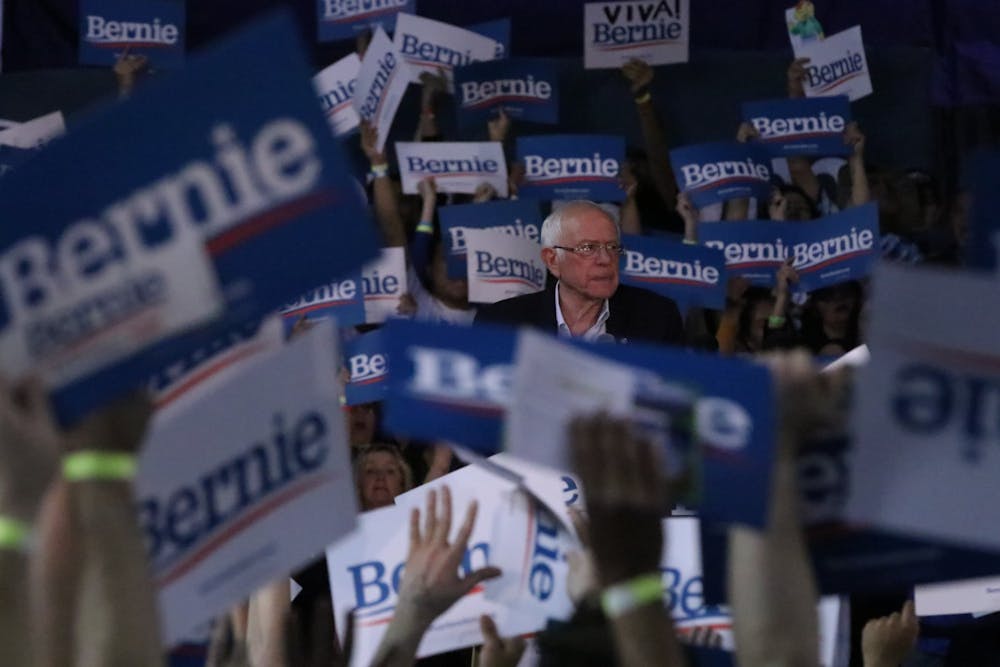Vermont Senator and Democratic presidential candidate Bernie Sanders visited Phoenix for the first time since starting his 2020 presidential campaign Thursday night at Veterans Memorial Coliseum.
After officially winning only three states — along with one presumptive win — on Super Tuesday, Sanders rallied his base 12 days before the Arizona presidential preference election, highlighting the differences between his campaign and that of former Vice President Joe Biden.
Despite this being one of his first appearances since his underperformance against Biden Tuesday, Sanders did not focus on that night, instead sticking to his traditional talking points and the need to defeat Trump.
He opened his rally calling out President Donald Trump’s leadership style and the state of the country under his leadership. He said that Trump made promises to the American people that he has yet to follow through on.
"In November, we’re going to teach Donald Trump a lesson about democracy,” Sanders said. "We’re going to make him a one-term president."
Trump himself held a rally at the same venue last month, and Sanders' crowd was significantly smaller Thursday, barely reaching the third level of seating, while Trump's rally filled to capacity before he arrived.
While Sanders was not met with the same amount of protestors as Trump either, the senator made a point to call them out during the beginning of his speech.
"You're outnumbered here, and you're going to be outnumbered in November," Sanders said as his supporters cheered.
READ MORE: Trump’s return to Phoenix met with mixed reactions from ASU community
The crowd responded positively to Sanders’ criticisms of his main Democratic opposition.
"Bernie is our best chance at beating Trump," said Miranda Vega, a freshman studying justice studies who attended the rally.
"Everyone calls him radical but everything is so polarized, so broken, that the 'radical' ideas he has aren't really that radical," Vega said.
Sanders showed his desire to unify against Trump, promising to support Biden if he wins the nomination and saying he knows Biden would do the same. But, Sanders said that the only similarity between him and Biden is that they’re both trying to beat Trump.
"This campaign is not just about beating Donald Trump, it's a political revolution," Sanders said.
He flaunted his voting record in the Senate compared to Biden's, appealing to voters by reminding them he voted against the Iraq War and told Wall Street to turn to billionaires rather than Congress after the 2008 recession.
Sanders then highlighted his future plans to overhaul social programs like the minimum wage, Social Security, workers unions, the criminal justice system and federal immigration policies.
Sanders said that he wanted to increase the minimum wage to $15 an hour and expand Social Security. He spoke about using Medicare to support a woman's right to chose in regard to abortion, abolishing private prisons and passing a Green New Deal.
"Bernie has inspired a lot of people," said Students for Socialism President Alexia Isais, a sophomore studying political science.
"We hope that people continue to mobilize under Bernie because there is an alternative to the Democratic party," Isais said, highlighting that the club believes that capitalism has let down a lot of low-income workers in the U.S.
Addressing climate change, education and gun safety, Sanders emphasized that he hasn't taken money from super PACs and instead pointed to his roughly eight million contributions from 2 million Americans.
A super PAC is an independent political action committee that can raise unlimited funds to support a political candidate, though they cannot work directly with parties or candidates themselves.
"This is a campaign of the working class, by the working class and for the working class," Sanders said.
Sanders focused a portion of his speech on education, mentioning that putting teachers first by paying them higher salaries could make education better overall.
"I've always sort of been a Bernie supporter," said Veronica Dominguez, a sophomore studying environmental science.
Dominguez said that she just took out her first student loan, and she came to hear Sanders speak about his policies on public education.
If elected, Sanders said that he will advocate for free public college.
For Dominguez, health care seems to also be a big issue, saying that her family has a history of diseases and she wants them to be taken care of at no extra cost — and she wants to have the security of a program that works for her too.
Sanders spoke about how everyone is negatively impacted when a sick person cannot afford to go to the doctor.
"The health care crisis is hard with an epidemic like the coronavirus," Sanders said.
Young Democratic Socialists of America at ASU chairman Tanzil Chowdhury, a senior studying materials science and engineering, said that the organization was "supporting Bernie for sure."
Chowdhury said that despite the club being "demoralized" by the results of Super Tuesday, "we're going to fight until the end. We didn't expect this to be easy."
Other political student groups like College Libertarians and ASU Young Democrats were not able to organize their entire groups to participate in the rally.
"We're not doing anything for the Bernie rally; by the time we heard about it there wasn't much time to really do much," said College Libertarians President David Howman, a graduate student studying justice studies.
In 2016, Sanders won nearly 40% of the Democratic vote in the Arizona presidential preference election, trailing behind Hillary Clinton who later won the nomination.
This year's presidential preference election will be held all over the state on March 17, two days after Phoenix hosts the 11th Democratic debate.
Editor's Note: Alexia Isais is a former opinion columnist for The State Press and had no involvement in the writing or editing of this article.
Reach the reporter at pjhanse1@asu.edu and follow @piperjhansen on Twitter.
Like The State Press on Facebook and follow @statepress on Twitter.

Piper Hansen is the digital editor-in-chief at The State Press, overseeing all digital content. Joining SP in Spring 2020, she has covered student government, housing and COVID-19. She has previously written about state politics for The Arizona Republic and the Arizona Capitol Times and covers social justice for Cronkite News.





